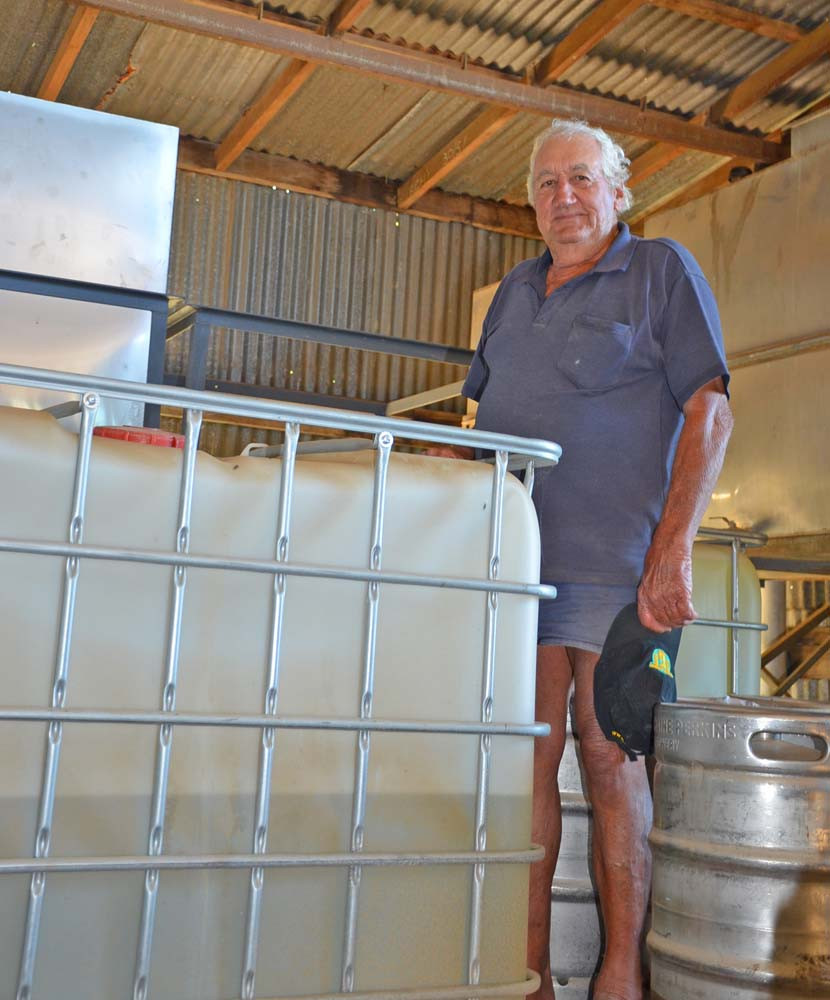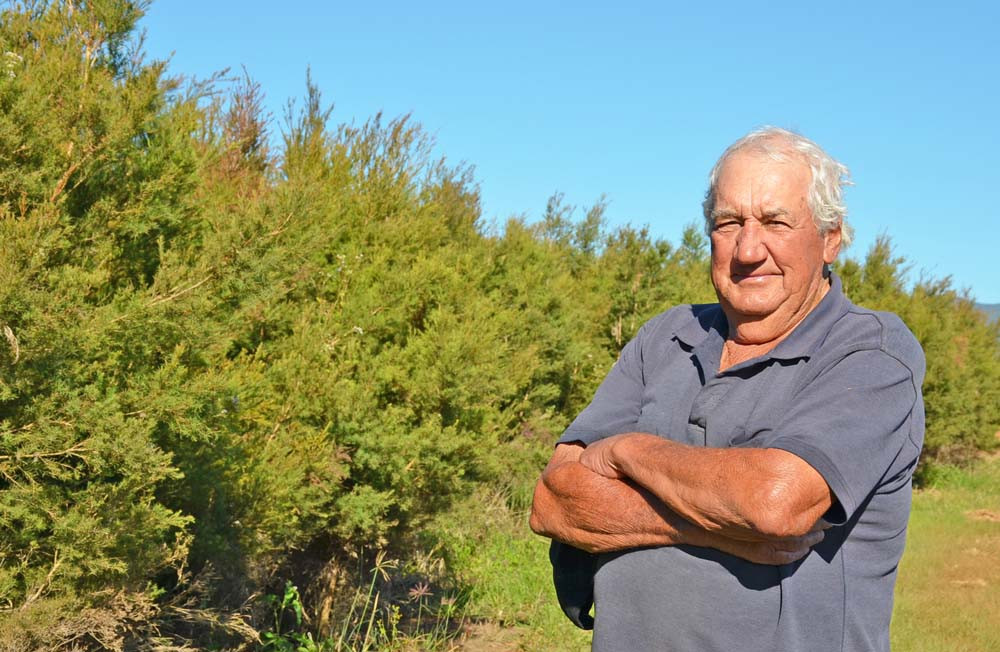Community & Business
19 June, 2024
Stockpiles build as oil demand drops
TEA tree growers like Makse Srhoj at Emerald Creek, and the Milicevic family of Milinder Farming at Mutchilba are having to stockpile their oil because of the downturn in the global demand for the product.

Mr Srhoj began planting trees about 30 years ago, following the end of the tobacco industry, and now has about 12,000 litres of oil in storage.

An expensive industry to enter into, Mr Srhoj said they had up to 50 acres of trees planted at one stage but this has been reduced to about six acres with trees that were now 30-35 years old.
While they had great success in the beginning, they faced their first downturn about 10 years into the market.
Following this collapse there was an oversupply of oil and again the market “fell dead” for a few years. The rollercoaster of the market saw the family momentarily leave the industry but it was only about 10 years ago when they revisited and began reproducing the oil.
“...when the price picked up then we came back into it,” Mr Srhoj said.
“I do not know why they are back into it (the downturn) now…maybe oversupply. It’s a big cost to get it established but once you plant it, that plant can last 30 to 40 years.”
However, the current downturn in the market has multiple growers either cutting down and removing trees or stockpiling oil they can’t sell.
“We have oil which we cannot move, which is a dilemma. It's been two years since we have virtually moved any oil,” Mr Srhoj said.
When Covid-19 hit, the demand for tea tree oil stopped.
“There was no demand for it and nobody could put their finger on why…the last 10 years it has been going really well but since Covid, it has completely dried up. We do not know why and we do not really know what to do at the moment,” he said.
With a number of farmers solely relying on the industry for income, many have had to leave the farm to find employment elsewhere.
He encouraged not just locals but all Australians to get behind the industry and use tea tree oil grown here on home soil.
Down the road at Mutchilba, Michelle and Ante Milicevic said they’ve not looked after their 20ha of trees for the past 18 months due to the downturn.
The pair, along with their three children, run Milinder Farming, where they are fortunate to have lime trees to fall back on, keeping their business afloat.
“...we have simply kept them alive with water. This year we have decided not even to water all the blocks and just keep a couple of blocks alive and will most likely pull out the rest of the farm, in particular the less productive varieties,” Michelle said.
Prior to Covid, their oil was sold through a cooperative into Europe and was in high demand.
“We would get calls to ask when we would be finishing our harvest as they were so keen to purchase,” she said.
After an extended period of time without sales through the co-op, Michelle said they decided to take matters into their own hands last August and started bottling the oil themselves.
“We have had many hick-ups and bumps along the way and I'm sure will continue to do so. We have basically broken even so far, it has been a lot of work so we're hoping it is all worth it in the end.”
With about 10,000 litres in stock, they hope to make the most of diversifying their business.
“It was a big decision to pull out the trees as these have been in the ground for many, many years. We aren't sure what we will replant with, and it will take some time to do this as we will most likely need to pull out the solid set irrigation before we can do this,” Michelle said.
Whilst they’ve made several hard decisions about the future of the trees, Michelle was excited by the products they’ve created and encouraged everyone to get behind the industry and embrace tea tree oil.
“We now produce a range of beautiful gift boxes containing our tea tree oil, tea tree soaps, an antiseptic roll-on, candles and we will be launching an all-natural deodorant in approximately two weeks.,” she said.
“We are constantly adding new products to our range...if it's got tea tree oil in it, we want to make it or wholesale it.”

Global factors affecting tea tree demand
TEA tree farmers across the region are feeling the impact of a downturn in the demand of the oil which has been affected in part by scrutiny from the European Union.
From being caught up in the European Green Deal regulation, flooding in the northern rivers, the Covid shipping crisis, increased stock holdings by manufacturers, and an upturn of production in 2021, sales of tea tree oil have been reduced since late 2022.
Australian Tea Tree Industry Association (ATTIA) chief executive office Lauren Hamilton said these combined factors had contributed to the downturn in the market.
“That combination of things pretty much turned the tap off to the orders,” Ms Hamilton said.
As part of the EU Green Deal, tea tree oil is in the spotlight thanks to reporting changes for Plant Protection Products.
A new round of testing has seen an Opinion released potentially classifying tea tree oil as having potential reproductive toxic effects.
Australian tea tree oil is sold into the EU for use in its cosmetic products.
With its presence in a fungicide, the European government mandated new testing for chemical registration in the EU. The testing that was conducted on rats showed a reproductive effect on male rats only at high doses. The tea tree oil was directly ingested by the rodent.
“Thanks to the Opinion released in February this year, we are now in a fight to keep tea tree oil available in cosmetic products in Europe,” Ms Hamilton said.
In response to the tests, Ms Hamilton said because tea tree oil was not ingested by humans and was used topically, it did not reflect the way the oil is safely used.
The ATTIA is now conducting its own research to submit a dossier to the EU defending tea tree oil.
“The EU only assesses hazard, not risk. Anything can be a hazard if used incorrectly. The opinion is a 1B classification which potentially wipes it out of the cosmetics industry. This science needs to be listened to,” Ms Hamilton said.
She said they hoped to have any decision overturned or delayed.
While these factors had resulted in a downturn in the demand for tea tree oil, Ms Hamilton said the market looked to be picking up.
“I see it across the industry…it is moving, not in the volumes that it was but it has picked up again,” she said.
She encouraged Australians to get behind the tea tree oil industry in Australia and buy the products labelled with an ATTIA code of practice logo.
“This makes sure you are buying the real stuff,” Ms Hamilton said.
“It’s an iconic Australian product. Everybody knows what tea tree oil is and uses it in one way or another. Even if it’s in day-to-day products that they may not know about. It is native to Australia, it’s very unique to us.”


